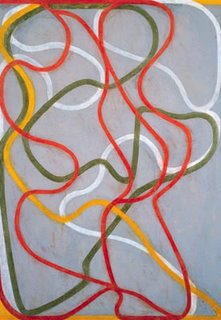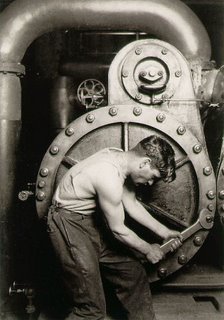Supreme Court justices expressed their doubts about the scientific expertise behind global warming during testimony on "a challenge to the Bush administration's refusal to regulate emissions of greenhouse gases in new vehicles," The Washington Post reports.Justice Antonin Scalia, in particular, made his skepticism known as he made several revelatory remarks. "When is the predicted cataclysm?" he asked an attorney representing twelve states who object to the EPA's relaxation of emissions standards for new automobiles.
In another exchange with the attorney, James R. Milkey, Scalia admitted to not understanding Earth's atmospheric divisions:
"Respectfully, Your Honor, it is not the stratosphere. It's the troposphere," Milkey said.
"Troposphere, whatever. I told you before I'm not a scientist," Scalia said to laughter. "That's why I don't want to have to deal with global warming, to tell you the truth."
Thursday, November 30, 2006
Scalia Change
Wednesday, November 29, 2006
More on Venezuela Reporting
President Hugo Chavez commanded a wide lead before Venezuela's election on Sunday, setting the stage for the self-styled revolutionary to intensify his anti-U.S., leftist crusade in Latin America.This is a newswire piece, not an opinion piece. Now, of course there's something we could call "fact" here: Chávez is far ahead in the polls, he uses revolutionary rhetoric. Chávez is explicitly not anti-US; he's anti-imperialist (and thus to the extent that the US is imperialist, he is anti-US - maybe Patricia is simply inferring from what we already know). Chávez is generally leftist, but as I've noted in another post below, the numbers suggest that he's not your old-timey leftist. Venezuela is the fastest growing economy in South America, with a recent growth rate much higher than the United States' (roughly 9% vs. roughly a paltry 2%).
How about "crusade"? Well, Chávez is a religious man in a religious nation and part of the Chavista program is making sure that Catholic values play a role in government.
OK, enough fakey disingenuousness. The point here is that this is the standard lede for a newswire piece and the lede suggests that Chávez and Venezuela are all about crusading against the US ignopring the fact that Venezuela does have its own domestic policy issues and international interests, as does any country. I'll gladly listen to criticism on those grounds (and, once again, I'm not a Chávez pollywog), but this kind of news piece is simply crap.
Mission Accomplished!
Six Years of Accomplishments with Secretary of Defense Donald H. Rumsfeld
A sample:
Overall: A multinational coalition has liberated 50 million people in Afghanistan and Iraq, with formation of representative governments and security forces.
Complicity and What Works
...For some reason, I keep thinking about an observation Eleanor Roosevelt made in an unpublished interview conducted in May of 1940, as the German Wehrmacht swept across France. She expressed dismay that a "great many Americans" would look with favor on a Hitler victory in Europe and be greatly attracted to fascism. Why? "Simply because we are a people who tend to admire things that work," she said. So, were the voters last month protesting Bush's policies—or were they complaining that he had not made those policies work? If Operation Iraqi Freedom had not been such an unqualified catastrophe, how long would the public have assented to the programs that accompanied the "war on terror": the legalization of torture, the suspension of habeas corpus, the unauthorized surveillance of law-abiding Americans, the unilateral exercise of executive power, and the Bush team's avowed prerogative to "create our own reality"?...I'm in a constant struggle with students over the questions underlying these passages. Not my graduate students, but some off-campus intelligence people I'm teaching this semester (of whom I should probably say nothing further). But I also see it everywhere - the claim, basically, that "morals" are subordinate to "what works." We live in a complex world, after all, they say, faced with terrible choices we simply have to make. There's no time for considering "what a bunch of philosophers say about morality" in such situations. And, in fact, we mostly just act based on our own "subjective" views and anything else is a function of power, the story goes. This series of claims is so very problematic that it's difficult to know where to start. I have my usual responses for purposes of class. But here I want to say something a little different.
The relevance of Third Reich Germany to today's America is not that Bush equals Hitler or that the United States government is a death machine. It's that it provides a rather spectacular example of the insidious process by which decent people come to regard the unthinkable as not only thinkable but doable, justifiable. Of the way freethinkers and speakers become compliant and self-censoring. Of the mechanism by which moral or humanistic categories are converted into bureaucratic ones. And finally, of the willingness with which we hand control over to the state and convince ourselves that we are the masters of our destiny...
We have become such "good Americans" that we no longer have the moral imagination to picture what it might be like to be in a bureaucratic category that voids our human rights, be it "enemy combatant" or "illegal immigrant." Thus, in the week before the election, hardly a ripple answered the latest decree from the Bush administration: Detainees held in CIA prisons were forbidden from telling their lawyers what methods of interrogation were used on them, presumably so they wouldn't give away any of the top-secret torture methods that we don't use. Cautiously, I look back on that as the crystallizing moment of Bushworld: tautological as a Gilbert and Sullivan libretto, absurd as a Marx Brothers movie, and scary as a Kafka novel.
One way of approaching this is to talk about "practice" or what's "practical." This has a certain satisfying ring for most Americans. Americans are fond of saying things like, "well, that may be fine in theory, but in practice..." and "that's just a theory" or "the facts say..." or "yes, but will it work?" The valued element of human action is workability, practicality, efficiency, productivity, etc., all of which, the old-timey technological determinists told us, are characteristics of the machine. The unreflective machine.
Of course, we don't want to do things that don't "work." That would be silly, if not simply pathological. Little attention, however, is paid by the American go-get-'em practice-minded folks to the fact that theory and what "works" are two sides to the same coin. We can't know whether or not something "works" unless we have a picture of what successful working would look like. And that picture is a product of both a cumulative epistemological history of mistakes and "successes" as well as a collection of interpretive schemes, beliefs, and value judgments. It makes no sense to talk about practice otherwise.
Yet, when it comes to examining underlying assumptions, new normative goals, feedback loops of values-in-practice, Americans are often rather immature. We have a few codes - the US Constitution, the Ten Commandments, and mom and dad's list - and that is deemed good enough. But there's very little ability to navigate the invariable conflicts that arise - via practice - regarding questions of value. When the list in question breaks down in the face of actual experience we'll often resort to either puerile sophisms or qualities of the machine. Since the qualities of the machine are empirically measurable in terms of quantities, we'll tend to call it a day regarding questions of objectivity. In other words, since value questions aren't measurable in these terms, they're simply "subjective" and not worthy of further discussion via-a-vis policy practices. Objectivity derives from the measurements of efficiency, cost, benefit, productivity.
Think of how we talk about that typically American fetish, "security." How do we know if we're more or less "secure"? Measurements of quantities: the number of police, the number of troops, the amounts of money, how many people in prison, how many bad people killed, the number of video cameras, the height of the wall, etc. All of these contain questions of value that strike at the deepest roots of any society. Ignoring them is perilous in that we then have little control over our collective future because we can't envision a future that might look better than the present except in terms of such measured quantities. The same goes for how we think of economy ("growth" is good), as well as how we think about democracy (as aggregative - the tally of individual votes - rather than deliberative - an intelligent, experimental discussion about policy directions).
Okay, I'm sounding like a curmudgeonly cultural theorist here. But I am dismayed when I encounter this form of thought among students; among anyone, really. Many want to talk about "values," in fact, but take that to mean what's already on the lists mentioned above. Sure, they're important, but values are under constant negotiation and they are not separate from practice, facts, or what works.
I'm afraid that this is where being "masters of our own destiny" ends, complicit in an ad hoc, blind future that allows us to toss out human decency in the name of what works. We can't see that reflective, human decency is the way out of the blindness.
Power and Mercy
- Elias Canetti, Crowds and Power
Cowards
From troops on the ground to members of Congress, Americans increasingly blame the continuing violence and destruction in Iraq on the people most affected by it: the Iraqis.This is cowardice bordering on criminality. Of course, criminality has led to this position.Even Democrats who have criticized the Bush administration's conduct of the occupation say the people and government of Iraq are not doing enough to rebuild their society. The White House is putting pressure on the government of Prime Minister Nouri al-Maliki, and members of the bipartisan Iraq Study Group have debated how much to blame Iraqis for not performing civic duties...
Iraqis' role in their own suffering has been an issue since shortly after the fall of Saddam Hussein in April 2003, when looters ransacked the national museum and Defense Secretary Donald H. Rumsfeld dismissed it by saying, "Stuff happens." But more than three years later, with schools and hospitals struggling, electrical service faltering, and police and government agencies infiltrated by sectarian death squads, the question of blame is more urgent.
For example, a Nov. 15 meeting of the Senate Armed Services Committee turned into a festival of bipartisan Iraqi-bashing...
Thomas Donnelly, a hawkish defense expert at the Center for Strategic and International Studies, said he considers blame a legitimate issue. "Ultimately, just like success rests with the Iraqis, so does failure," he said. "We've made a lot of mistakes, but we've paid a huge price to give the Iraqis a chance at a decent future."...
"Our role is not to resolve those issues for them," [Condoleeza] Rice told reporters last month after pressing Maliki to be bolder about disbanding militias and reconciling sectarian differences. "They are going to have to resolve those issues among themselves."....
I don't want this war to go on any more either. No one does. But blaming Iraq for being invaded, occupied, having its infrastructure and government destroyed, and having had hundreds of thousands of its citizens killed is of the most profound moral cowardice.
The US has lost this war and created further chaos in the Middle East. It is an American responsibility; it is the Bush administration's responsibility. Now the administration and its lackeys, in order to save a small bit of face for themselves alone, want to turn the US into a nation of cowards (in addition to be an empire transcendent to international law, a bully nation, and a torturing nation) by tiptoeing backwards out of the chaos and blaming the victim?
Cowards and bullies do that.
Tuesday, November 28, 2006
Sea Lion Attack!
Last year, a group of sea lions took over a Newport Beach marina and caused a vintage 50-foot yacht to capsize when they boarded it.There's more....
UPDATE:
Parrot and emu attacks in Germany!
"Civil War"
I have this thing about Definitions. In short, I hate them. Perhaps its the influence of Wittgenstein in my work, but nothing irks me more than people who lay out a dictionary definition, as if its obvious, and proceed with a political or academic analysis, leading logically to some conclusion. As those people say in debates, well, if we could only agree on defining terms..... well, sure, then the debate would be all over.
Within IR, one of the most important insights of critical, constructivist, post-structural (and others) theory is that the political battle over definitions is a central aspect of how the world works. Once something is "labeled" and "legitimated" as that thing, it creates a whole realm of possible pathways for action and forecloses others. So, to say, well, the definition of such and such a thing is X, Y, Z is to engage in a political act creating a topography of possibility for that such and such a thing. Unpacking and investigating that battle is then a very interesting locus of academic study.
Which brings us to tonight's word: Civil War. [read on...]
Getting Out of Iraq


The Venezuelan Election
Reporting on Venezuela in the mainstream press has a long history of inaccuracies, shoddy investigation, propaganda (and here), blatant ridiculousness, and a lack of understanding of the Venezuelan situation in particular and Latin American history in general. But there is a frame that has been set in the US media by the opposition in Venezuela which denies the possibility that the Chávez project is anything other than nefarious. Even "success" stories are not taken as success stories in themselves (and for criteria which would be considered "successes" from an American point of view) but are offered up as instances of Hugo Chávez's hypocrisy.
In other words, there is no picture of Chávez in the mainstream US media that ventures to portray him in anything other than an unflattering light. The few examples that do exist come with hints of elitism, as when American journalists interview poor Chavistas and subtly describe them as uneducated and intoxicated by Chávez's charisma. This basic picture falls into line with the media message of the opposition in Venezuela, which happens to account for the majority of the newspapers and television stations (despite the Bush administration's pronouncements of a lack of freedom of speech in Venezuela). Indeed, the mainstream US media representation of Chávez is just the Venezuelan opposition representation. (See, conversely, this account of the elections).
We'll keep to the side the hypocrisy of these claims from an American media that fell over itself to confirm the Bush message - when alternative accounts of the probable outcomes were widely accessible - that led us into a disastrous war, and other disastrous policies.
As for the media representation, take, for instance, the several pre-election polls coming out of Venezuela (see here for a comparative analysis: Presentation of new Venezuelan Poll - in English - November 2006). While some external polls publish their methodologies and the official poll in Venezuela is also transparent, those polls showing Manuel Rosales' numbers close to Chávez's or with Rosales in the lead have mysterious backgrounds. They do not publish their methodologies; they are not transparent. Yet, the media narrative about the election often suggests that the gap is closing between these two main candidates.
It's curious to me... if the non-transparent polls are an attempt to prepare the grounds for yet another opposition claim that the elections are illegitimate, and to stimulate further dissent... then why are the poll methodologies so poorly disguised? Everyone knows that polls depend on methodology. Since polls can show nearly anything, you simply have to publish the methodology along with any poll results for a poll to be considered to have any legitimacy.
I wonder who the polls that show a neck-and-neck race are intended to influence. It wouldn't appear to be the international audience, since most internationals paying attention to polls in Venezuela would have some poll literacy. It would seem to be those who are illiterate when it comes to the nature of polls. Wouldn't this be an odd target audience in Venezuela? Those who are, generally, poorer and less educated? Or is this a way of trying to influence opinion within the population of those who traditionally vote for Chávez? This would seem to be consistent with Rosales' proposal for the "Mi Negra" cards for the poor. If this hypothesis is correct, then it would show at least two things: 1) the opposition knows it needs to target the main part of the citizenry and has thus changed its tactics; and 2) they think there's a real possibility that they can change enough public opinion within Chávez's constituency to either a) have the vote turn in their favor and actually win this election; or b) create serious dissent within the country among the poor. But I doubt it would be a matter of influencing international opinion regarding the legitimacy of the elections unless the opposition could manage serious dissent among the poor.
This is wildly speculative on my part, but this strategy has the characteristics of a Karl Rove strategy. He is famous for taking the strength of an opponent and turning it into a weakness. So, for example, if Rove had his fingerprints on tactics in Venezuela, it would look something like this - rather than a direct competition with Chávez, or a brute attempt at a coup, he would try to turn opinion among the poor against Chávez. That is, he would try to foment doubts and confusion among Chávez's base constituency.
Rosales says he will abide by the results of the election as long as the election is fair and transparent. Good for him. But the polls may very well be intended to demonstrate a priori that the election was not fair, to set up the potential for another coup or at least further dissent. There is, at this point, no reason to suspect that the election is rigged. Watch for the post-election statements of independent international observers, and ignore the claims of either the chavistas or the opposition. There is good reason to think that disunity is the goal of the opposition.
Back to the main point, however.... Regarding Chávez, there may be very good reasons to remain skeptical about his programs. But there is no good reason, on the other hand, to not be skeptical about opposition claims about Chávez and about their own proposals. The US media, however, has made a choice in advance. Thus, it once again serves no one except those who would believe the Bush administration's talking points about Chávez and about the general directions in Latin America. It obscures understanding of the politics of Latin America, and prepares the way for more disastrous policy, should it come to that. Given the heavy investments by the US in Venezuela's most shrill opposition group, Súmate, and the use of the controversial Penn, Schoen, and Berland as a polling source and basis for claims about electoral fraud, the scene is set for further attempts to delegitimize the electoral outcome.
Oh, and PS: Here's the US's position at this point:
The United States warned people to stockpile food, water and medicine in Venezuela in case a vote on Sunday sparks public disorder as anti-U.S. President Hugo Chavez seeks reelection.UPDATE:In a warning to Americans living in Venezuela, which provides about 12 percent of U.S. oil imports, the U.S. Embassy said on Tuesday it had no information Venezuela would slip into lawlessness.
Also check out this speculation - with some support - on the "planned" post-election coup (the Nov. 21st entry).
Monday, November 27, 2006
Coffee Zombie-Economy

Adam Kotsko makes me wonder whether I am indeed a zombie, the vanguard of late capitalism, or perhaps an individual product in the constitution of post-capitalism. Regardless, I like my French Roast espresso, half milk, natural cane sugar. I make it myself, so zombified am I.
"...the increased number of coffee shops will produce an increased demand for coffee. There are several vacant storefronts in the neighborhood that could easily be converted into coffee shops -- the "general store" that's been closed since I moved here, along with the "big and tall" store that is currently in the process of closing. These businesses belong to the "old economy." When they are converted to coffee shops, our neighborhood will become a major hub in the "new economy" -- producing not discrete commodities, but rather time itself in the form of sleeplessness. This will create a feedback loop prompting the coffee shops to stay open 24 hours; local residents will flock to them desperately, sensing that a headache of world-historical proportions awaits them if they allow caffeine withdrawal the slightest foothold.
Certainly we all laughed at The Onion's invocation of Starbucks' "sinister phase two" -- meaning that it struck a chord in our political unconscious. Yet it is only now that we are beginning to understand that Starbucks is not the primary agent in this "phase two" of coffee culture -- indeed, is just as much caught in the flow of events as anyone else. As our bodies adjust to the historic shift of coffee from a breakfast beverage to an all-purpose social and professional lubricant, biology and economics begin to work together to produce a condition that can only be described as the wholesale zombification of the populations of the advanced capitalist countries."
Sunday, November 26, 2006
Brice Marden
Another Domino in South America
Ecuador's presidential candidate Rafael Correa has claimed victory in Sunday's run-off election.Three exit polls and an unofficial quick count indicated Mr Correa had gained around 57% of the vote while Alvaro Noboa polled about 43%...
Although the official result has not yet been announced, Mr Correa has moved quickly to make policy announcements and appoint ministers.
He said he will try to rejoin the Organisation of Petroleum Exporting Countries (Opec) which Ecuador left in 1992.
He also named leftist economists Ricardo Patino and Alberto Acosta as his economy and energy ministers, Reuters news agency said...
An economic aide to Mr Correa said he would not pay some of Ecuador's "illegitimate" foreign debt and would not sign a free trade agreement with the United States, Reuters said.
While campaigning, Mr Correa said he wanted to renegotiate contracts with foreign oil companies.
Mr Correa is close to Venezuela's anti-American President Hugo Chavez and has called US President George W Bush a "dimwit".
"War Is Peace"
...The real fallacy does not lie in labeling the struggle with Al Qaeda a "war," but in the false constitutional theory that gives the President a vast set of "war powers" to be used everywhere he discerns a "battlefield," which of course can be anywhere on Earth. Nothing in the Constitution suggests anything of the sort, and it is hard to see why a democratic constitution ought to do so. Perhaps, in a moment of supreme emergency, the President would be compelled to declare martial law. Bush’s constitutional theory turns a hypothetical "state of exception" into a long-term state of siege, the basic tactic of tyrants for the past two centuries, as Giorgio Agamben notes in his remarkable book State of Exception. Under the Bush theory, moreover, the President can have his martial law without ever declaring it publicly. That is the significance of the Administration’s secret illegal wiretapping. In their view, it was not illegal: it was part and parcel of the President’s war powers. But the public need not and should not know that the President was exercising those powers, because that might lead to political blowback that would interfere with his war plan. In other words, the fact that our phone conversations fall under a kind of martial law was a state secret...
In the end, what's wrong with calling the struggle against Al Qaeda a "war" is not that the war label is inaccurate. Rather, it's that the administration uses that label to justify an outrageous presidential power-grab, which apparently includes the power to conceal just how much power the President has grabbed. Oddly, it appears that not calling the Iraq debacle a "civil war" serves the same purpose: concealment for political reasons. Language becomes a tool to obfuscate, not to communicate. War is peace.
Landmark
The war in Iraq has now lasted longer than the U.S. involvement in the war that President Bush's father fought in, World War II.
As of Sunday, the conflict in Iraq has raged for three years and just over eight months.
Only the Vietnam War (eight years, five months), the Revolutionary War (six years, nine months), and the Civil War (four years), have engaged America longer.
Fighting in Afghanistan, which may or may not be a full-fledged war depending on who is keeping track, has gone on for five years, one month. It continues as the ousted Taliban resurges and the central government is challenged.
Saturday, November 25, 2006
Dead Pantagruel
While likely not a conservative myself - whatever that means - I will truly miss them. I'll let them close with their own words. While I disagree that it is enough to love and inhabit one's own small circle, we ought to see in these words those little things we all share. Life is, after all, a "joyous catastrophe."
...to live in love with the frailty and limits of one’s existence, suffering the places, customs, rites, joys, and sorrows of the people who are in close relation to you by family, friendship, and community--all in service of the truth, goodness, and beauty that is best experienced directly. The discipline of place teaches that it is more than enough to care skillfully and lovingly for one’s own little circle, and this is the model for the good life, not the limitless jurisdiction of the ego, granted by a doctrine of choice, that is ever seeking its own fulfillment, pleasure, and satiation.Taking that charge seriously, The New Pantagruel has, essentially, argued itself out of existence. This is a good thing. In the end, we are pessimistic romantics. We believe life is eucatastrophic: a joyous catastrophe. Instead of spending endless hours before the faceless void of the “new media,” we will be engaging the tragedies and necessities of raising families, rebuilding neighborhoods and small towns, and fighting to preserve and save that which we love. As we dive back into the particularities of our places and people and their needs, we hope you will do the same.
Destruction Construction Dream
I take to the asphalt with a geologist's handpick, the kind with the smooth hard-leather handle. The asphalt sticks in some places more than others making it impossible to pull back the entire street like one would bedcovers, although I do try. It is much easier, I find, if I begin at the side of the street - the seam where asphalt meets the concrete curb - and work towards the middle. I chip at it. The asphalt is about two inches thick and comes away from the handpick in large chunks. Underneath the asphalt is a mix of gravel and sand. I brush the gravel away. Beneath that layer, adjusting my eyes to the dark, is a ten-foot deep system of wooden beams, cross-sections, stilt-like columns, impossibly suspending and supporting the gravel layer and the asphalt. The space in between is black, empty space.
I wonder why the street would have been built this way. Is there some underground stream of water they attempted to avoid? Or, rather, is this a drainage system? Conversely, were the houses built too high and the street had to be raised to render it practical? I wonder if the hollow street gives off a percussive gourd-like sound when cars pass over it.
I dig and dig. Rising and surveying my work, I see that I have made a two-foot wide trench along the side of half of the street. The holes extend into the street at various points where the asphalt had given way a little easier.
The neighbors are nice enough, although I try to hide my secret that I am not a roadworker or construction person. I'm simply digging up their street. I have some excuse - some good enough lie - and tell them the holes will be filled by the next morning. The neighbors bring me something to drink. They watch my dog, who is acting remarkably well-behaved, despite a minor spat with one of the neighborhood dogs.
But now I also have second thoughts. The street is wrecked. I have no material with which to fill the holes. Cars could fall into the empty space below the street. I think that I should at least leave some traffic cones, so that the neighbors don't drive their cars into the underground cavern. Since I'm unequipped for serious road construction work - since I am a philosophy professor - I have no traffic cones. I call my dog. I decide to leave immediately and quietly, passing up invitations to dine with the neighbors.
I make sure when I drive away, dog in the passenger seat, that I follow streets that will keep me as far as possible from the neighborhood street. The evening sun is reflected through the streets in orange beams from countless window panes.
Friday, November 24, 2006
Companies Start to Get Climate Change
While the political debate over global warming continues, top executives at many of the nation's largest energy companies have accepted the scientific consensus about climate change and see federal regulation to cut greenhouse gas emissions as inevitable.The Democratic takeover of Congress makes it more likely that the federal government will attempt to regulate emissions. The companies have been hiring new lobbyists who they hope can help fashion a national approach that would avert a patchwork of state plans now in the works. They are also working to change some company practices in anticipation of the regulation.
"We have to deal with greenhouse gases," John Hofmeister, president of Shell Oil Co., said in a recent speech at the National Press Club. "From Shell's point of view, the debate is over. When 98 percent of scientists agree, who is Shell to say, 'Let's debate the science'?"...
"If we had our druthers, we'd already have carbon legislation passed," said John L. Stowell, Duke Energy's vice president for environmental policy. "Our viewpoint is that it's going to happen. There's scientific evidence of climate change. We'd like to know what legislation will be put together so that, when we figure out how to increase our load, we know exactly what to expect."
I think this is the right track. Look, there's no getting around the problem of climate change. Companies like Exxon ought to be shoved out of business by consumers for dragging us through lies and deceit for the past decade. Same goes for the political leaders, like the current president and vice-president, who have also maintained a disingenuous propagandic front about climate change and the United States' overwhelming contribution to the problem.
Dealing with climate change via industry has always been a crucial step. The US has always said that the country would make no steps in the direction of mitigating climate change if these steps harmed "national interests." But there's a little, unspoken secret when it comes to industry - companies are often much less concerned about absolute profits than they are relative profits. That is, if all other companies in direct competition with each other were to accept new GHG-mitigation technologies and policies, or if they all had to abide by the same regulatory regime (and we're necessarily talking strict regulations here), then agreement would be much easier to find. As long as bastards like Exxon have held out for absolute gains in the energy market, this has been impossible.
Now, however, will we see a real stab at mitigating climate change and the GHGs that cause it? If the cause interesgts you - and it obviously ought to - then you might consider pushing your representatives, boycotting companies like Exxon, and demanding of the new Democratic Congress that they finally make a genuine effort at creating a climate change regime that makes substantive progress.

































































